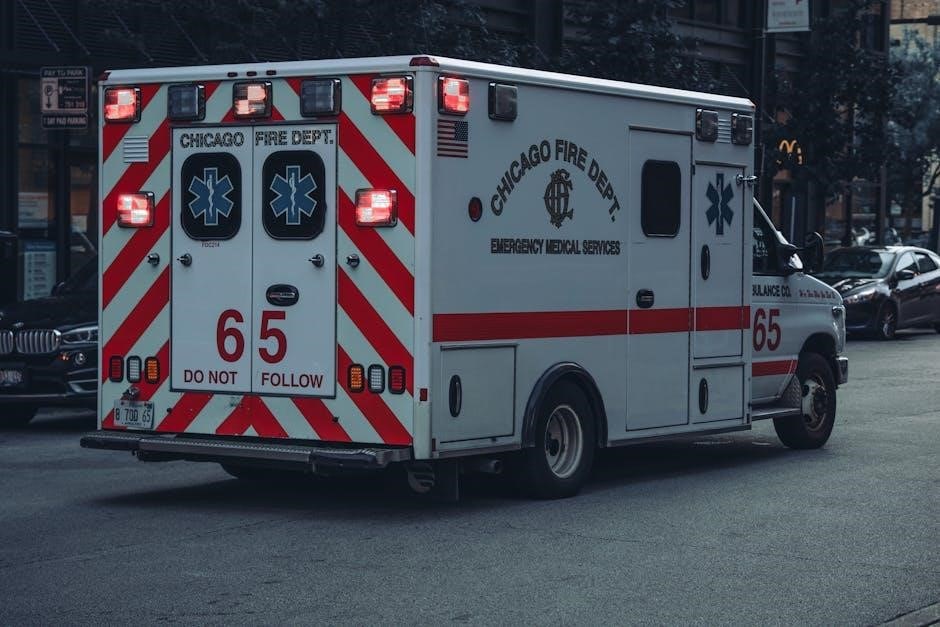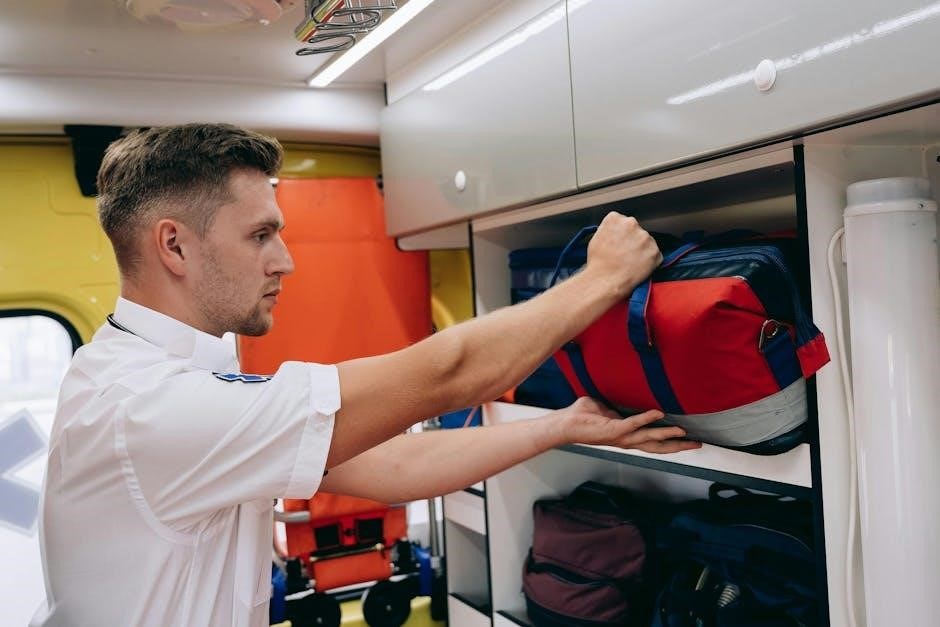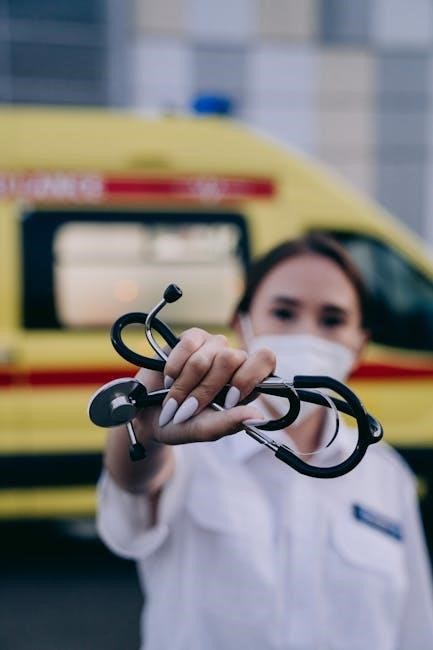
First Aid for the USMLE Step 2 CK is a cornerstone guide for exam preparation, offering high-yield clinical knowledge in a concise, bulleted format with mnemonics and tables.
Overview of the USMLE Step 2 CK Exam
The USMLE Step 2 CK exam evaluates clinical knowledge and patient management skills, focusing on diagnose and treat illnesses. It is the second exam in the USMLE series, typically taken after Step 1 and before clinical rotations. The exam consists of multiple-choice questions divided into 8 blocks, each containing 40 questions, over 8-9 hours. It assesses the ability to apply medical knowledge in real-world scenarios, making it critical for residency applications. Preparation often involves resources like First Aid for Step 2 CK to master high-yield topics and clinical reasoning.
Importance of First Aid in USMLE Preparation
First Aid for the USMLE Step 2 CK is a cornerstone resource for exam preparation, offering a concise, high-yield review of clinical knowledge. Its organized format, featuring bulleted points and mnemonics, helps students efficiently master critical concepts. By focusing on frequently tested topics, it streamlines study efforts, making it indispensable for time-sensitive preparation. Many successful test-takers attribute their performance to First Aid, as it bridges gaps in knowledge and reinforces essential clinical reasoning skills. Its annual updates ensure relevance, solidifying its role as a key tool for achieving success on the USMLE Step 2 CK exam.

Structure and Content of First Aid for USMLE Step 2 CK
First Aid for the USMLE Step 2 CK is structured by clinical disciplines, offering concise, high-yield information through bulleted points, mnemonics, and tables, ensuring efficient exam preparation.
Organization by Clinical Disciplines
First Aid for the USMLE Step 2 CK organizes content by clinical disciplines, such as internal medicine, pediatrics, and surgery, ensuring a logical flow of information. This structure mirrors the exam format, allowing students to systematically review high-yield topics. Each section focuses on core concepts, diagnostic approaches, and management strategies, making it easier to integrate with clinical rotations. The discipline-specific approach helps students identify and strengthen weak areas, aligning with the exam blueprint for optimal preparation.
Key Features: Bulleted Points, Mnemonics, and Tables
First Aid for the USMLE Step 2 CK excels with its concise, high-yield format, featuring bulleted points for quick review and retention. Mnemonics are strategically incorporated to simplify complex concepts, aiding memory retention. Tables and comparison charts are used to clarify differences between similar diseases, medications, or diagnostic criteria. These features enhance readability and focus on exam-relevant material, making the book an indispensable tool for efficient study and mastery of clinical knowledge.
Coverage of High-Yield Topics
First Aid for the USMLE Step 2 CK focuses on high-yield topics that are frequently tested on the exam, ensuring students prioritize their study time effectively. The book provides concise summaries of key clinical knowledge, including diseases, diagnostic criteria, and management strategies. Updated annually, it reflects the latest exam trends and emphasizes areas where students often struggle. By concentrating on the most critical concepts, First Aid helps learners efficiently master the material necessary for success on the Step 2 CK exam.

Study Strategies Using First Aid for Step 2 CK
Leverage active recall and spaced repetition to enhance retention of high-yield clinical concepts, ensuring comprehensive understanding and mastery of key topics for exam success.
Active Recall and Spaced Repetition
Active recall and spaced repetition are powerful strategies for retaining clinical knowledge. Use First Aid’s concise format to actively recall key concepts, testing yourself frequently. Implement spaced repetition by reviewing material at increasing intervals to enhance long-term retention. These techniques ensure that high-yield information is deeply ingrained, making it easily accessible during the exam. By incorporating these methods, you can maximize the effectiveness of your study sessions and perform confidently on the USMLE Step 2 CK.
Integration with Other Study Materials
First Aid for the USMLE Step 2 CK can be seamlessly integrated with other study resources, such as practice questions from UWorld and case studies from Boards and Beyond. By cross-referencing these materials, students create a comprehensive study plan that reinforces key concepts. This approach ensures a well-rounded preparation, addressing both clinical knowledge and practical application. Integration enhances the effectiveness of each resource, providing a cohesive learning experience tailored to excel on the exam.
Focus on Weak Areas
Identifying and addressing weak areas is crucial for success on the USMLE Step 2 CK. First Aid helps pinpoint gaps in knowledge through its focused, high-yield content and practice questions. By emphasizing key clinical topics and providing concise explanations, the guide enables targeted study. Students can use the book’s structured format to concentrate on areas where they need improvement, ensuring a more efficient and effective preparation process. This tailored approach helps build confidence and strengthens foundational knowledge, leading to better performance on exam day.

Comparison with Other Study Resources
First Aid for USMLE Step 2 CK is frequently recommended alongside resources like Step-Up to USMLE Step 2 CK and Master the Boards, offering a concise, high-yield format.
Step-Up to USMLE Step 2 CK
Step-Up to USMLE Step 2 CK is a popular study resource known for its case-based approach, providing practical clinical scenarios and high-yield information. It complements First Aid by offering detailed explanations and focusing on common exam topics. While First Aid excels in concise, bullet-pointed facts, Step-Up enhances understanding through its emphasis on clinical decision-making and real-world applications. Many students use both resources together, leveraging Step-Up for in-depth learning and First Aid for quick review. This combination is particularly effective for mastering complex clinical concepts and exam strategies.
Master the Boards for USMLE Step 2 CK
Master the Boards for USMLE Step 2 CK is a trusted resource offering detailed explanations of clinical concepts and high-yield information. It focuses on exam-style questions and case-based learning, helping students apply knowledge in real clinical scenarios. While First Aid is known for its concise format, Master the Boards provides in-depth discussions, making it ideal for students needing more comprehensive explanations. It’s often used alongside First Aid to bridge gaps in understanding and reinforce key concepts, ensuring a well-rounded preparation strategy for the exam.
Boards and Wards
Boards and Wards is a popular study resource for the USMLE Step 2 CK, known for its detailed clinical knowledge and case-based approach. It organizes information by systems, covering essential topics like internal medicine, surgery, pediatrics, and obstetrics and gynecology. The text is supplemented with full-color images and diagrams, making complex concepts easier to understand. While it overlaps with First Aid in high-yield content, Boards and Wards offers more in-depth explanations, making it a valuable companion for students needing a comprehensive review. Its user-friendly format ensures quick access to critical information during exam preparation.

How to Maximize the Use of First Aid for Step 2 CK
Maximizing the use of First Aid for Step 2 CK involves leveraging its high-yield content, organized by clinical disciplines, and utilizing features like bullet points and mnemonics. Integrate it with practice questions and other resources to reinforce learning. Customize the book with annotations and focus on weak areas. Employ active recall and spaced repetition for better retention. Ensure timely updates and use the latest edition to stay current with medical knowledge. This strategic approach enhances exam preparation and performance.
Annotation and Customization
Annotation and customization are key strategies to optimize the use of First Aid for the USMLE Step 2 CK. By adding personal notes, highlighting critical points, and creating concept maps, learners can tailor the content to their needs. Many students use different colored pens or digital tools to mark high-yield information, making it easier to review. Customizing the book allows for a more engaging and effective study experience, helping to reinforce memory and understanding of complex clinical topics. This active engagement with the material is a proven method for achieving exam success.
Practice Questions and Self-Assessment
Integrating practice questions and self-assessment is crucial for mastering the content in First Aid for the USMLE Step 2 CK. The book includes high-yield questions that simulate real exam scenarios, helping students test their knowledge and identify weak areas. Self-assessment tools, such as practice tests and review sections, allow learners to gauge their progress and refine their understanding of clinical concepts. Regularly engaging with these features ensures a thorough preparation for the exam, fostering confidence and competence in applying clinical knowledge effectively.
Timely Updates and Revisions
First Aid for the USMLE Step 2 CK is regularly updated to reflect the latest exam content and medical advancements. Each new edition incorporates feedback from students and clinicians, ensuring relevance and accuracy. Updates include new high-yield topics, revised clinical guidelines, and enhanced study aids like mnemonics and tables. This commitment to currency guarantees that learners have the most up-to-date information, aligning with the evolving nature of the USMLE Step 2 CK exam and improving their chances of success.

Clinical Knowledge and Diagnostic Skills
First Aid for the USMLE Step 2 CK provides comprehensive coverage of high-yield clinical topics, focusing on disease pathogenesis, management, and diagnostic approaches. It enhances understanding and application of medical concepts through detailed case studies, pharmacology, and practical clinical scenarios, ensuring learners can efficiently diagnose and manage patients.
Disease Pathogenesis and Management
First Aid for the USMLE Step 2 CK offers detailed insights into disease mechanisms and evidence-based treatments. Organized by system, it covers pathophysiology, symptoms, and management strategies. High-yield topics are highlighted, with bulleted points and comparison tables for clarity. Mnemonics aid memory retention, while case studies apply concepts to real-world scenarios. The book emphasizes understanding disease processes and selecting appropriate therapies, aligning with exam questions. Updated annually, it reflects the latest clinical guidelines and exam trends, ensuring learners master essential knowledge for both the exam and patient care.
Case Studies and Clinical Scenarios
First Aid for the USMLE Step 2 CK incorporates real-life case studies to simulate clinical encounters, enhancing understanding of diseases and diagnostic approaches. These scenarios cover high-yield topics like internal medicine, pediatrics, and emergency care. Each case includes patient history, symptoms, and physical exams, followed by differential diagnoses and management plans. Mnemonics and comparison tables reinforce learning, while emphasizing evidence-based practices. This approach helps students apply knowledge to clinical problems, mirroring the exam format and improving decision-making skills for patient care.
Pharmacology and Therapeutics
First Aid for the USMLE Step 2 CK provides a concise yet comprehensive review of pharmacology, focusing on high-yield medications and their therapeutic applications. Key points include mechanisms of action, indications, dosages, and potential side effects. The text emphasizes drugs commonly tested on the exam, such as antibiotics, antihypertensives, and antidiabetics. Mnemonics and comparison tables simplify complex concepts, enabling efficient memorization. Updates reflect the latest clinical guidelines, ensuring students are well-prepared to apply pharmacological knowledge to patient care scenarios.

Time Management and Test-Taking Strategies
First Aid for the USMLE Step 2 CK emphasizes efficient study habits, such as active recall and spaced repetition, to maximize learning. Prioritize high-yield topics and simulate exam conditions to build stamina and accuracy.
Approach to Multiple-Choice Questions
Mastering multiple-choice questions (MCQs) is critical for success on the USMLE Step 2 CK. First Aid for the USMLE Step 2 CK recommends active recall and spaced repetition to reinforce knowledge. When tackling MCQs, read the question carefully, identify key terms, and eliminate distractors. Focus on high-yield topics and classic question structures. Use mnemonics and comparison tables to differentiate diagnoses. Practice under timed conditions to simulate exam stress. Review explanations to understand why incorrect options are wrong, enhancing long-term retention and clinical reasoning skills.
Efficient Use of Exam Time
Efficient time management is crucial for success on the USMLE Step 2 CK. Allocate a set amount of time per question to avoid spending too long on difficult ones. Skim through questions to identify high-yield topics and focus on those first. Use practice tests to refine your pacing and ensure you complete all questions within the allotted time. Avoid unnecessary distractions and maintain a steady rhythm. By mastering time management, you can optimize your performance and reduce exam-day stress.
Handling Difficult Questions
When encountering difficult questions on the USMLE Step 2 CK, remain calm and systematically approach each item. Read the question carefully, focusing on key details and eliminating obviously incorrect options. Use your knowledge of high-yield topics from First Aid for the USMLE Step 2 CK to identify the most likely answer. If unsure, make an educated guess based on patterns and associations. Avoid spending excessive time on a single question, as this can impact your ability to complete the exam. Practice with timed questions to improve decision-making and reduce anxiety during the exam.

Psychiatry, Ethics, and Legal Issues
First Aid for the USMLE Step 2 CK covers high-yield psychiatry topics, ethical dilemmas, and legal issues, providing clear mnemonics and tables to enhance understanding and retention.
High-Yield Topics in Psychiatry
First Aid for the USMLE Step 2 CK emphasizes high-yield psychiatry topics such as major depressive disorder, anxiety disorders, schizophrenia, and bipolar disorder. It also covers neurodevelopmental disorders like ADHD. The guide provides mnemonics and comparison tables to differentiate between similar conditions, such as psychotic vs. mood disorders. Key treatments, including first-line medications and psychotherapies, are highlighted. Ethical considerations and legal issues in psychiatry, like involuntary commitment and patient confidentiality, are also addressed. These sections are designed to ensure a thorough understanding of core concepts for exam success;
Ethical Dilemmas and Medical Law
First Aid for the USMLE Step 2 CK covers essential ethical dilemmas and legal issues in medicine, such as patient confidentiality, informed consent, and end-of-life care. It addresses common legal topics like medical malpractice, negligence, and liability. The guide also emphasizes key ethical principles, including autonomy, beneficence, non-maleficence, and justice. Practical scenarios and case-based examples help applicants apply these concepts to real-world situations, ensuring readiness for exam questions on medical ethics and law. These topics are critical for both clinical practice and board success.
Communication Skills

First Aid for the USMLE Step 2 CK emphasizes the importance of effective communication skills in clinical practice. It provides high-yield tips on patient-doctor interactions, including history-taking, breaking bad news, and cultural competence. The guide highlights key strategies for clear and empathetic communication, which are critical for success in both clinical encounters and board exams. Practical examples and case scenarios help learners master these skills, ensuring they can connect effectively with patients and colleagues in real-world settings. Strong communication is a cornerstone of medical practice and exam success, and First Aid ensures it is well-addressed.

Final Preparation and Exam Day Tips
First Aid for the USMLE Step 2 CK highlights the importance of rest, review, and logistics on exam day. Ensure adequate sleep, a nutritious meal, and arrive early to avoid stress. Reviewing key concepts and staying calm are crucial for optimal performance.
Rest and Relaxation Before the Exam
Adequate rest and relaxation are critical for peak performance on exam day. Ensure 7-9 hours of sleep before the test to maintain cognitive function. Avoid strenuous activities and mentally demanding tasks. Engage in calming activities, such as reading or meditation, to reduce stress. Stay hydrated and eat a balanced meal to fuel your brain. Mentally review key concepts without overloading yourself. Prioritize a calm and focused mindset to approach the exam with confidence and clarity. Proper rest ensures optimal focus and decision-making skills during the exam.
Review of Key Concepts
Reviewing key concepts is essential for consolidating knowledge and ensuring readiness for the USMLE Step 2 CK. Focus on high-yield topics emphasized in First Aid, such as disease pathogenesis, management, and clinical presentations. Use active recall to test your understanding of critical areas like pharmacology, ethics, and diagnostic skills. Spaced repetition helps reinforce long-term retention. Prioritize concise summaries and mnemonics to streamline your review process. Integrate First Aid with flashcards or practice questions to apply concepts practically. Ensure you revisit weak areas identified during your study sessions for a comprehensive review.
Logistics and Exam Environment
Understanding the logistics and exam environment is crucial for a smooth test-taking experience. The USMLE Step 2 CK is administered at Prometric test centers, requiring proper registration and identification. Familiarize yourself with the exam format, which includes multiple-choice questions and clinical scenarios. Plan to arrive early to account for check-in procedures. The exam environment is standardized, with strict rules about prohibited items. Ensure you adhere to all guidelines to avoid delays or issues. Proper preparation of logistics ensures you can focus solely on demonstrating your clinical knowledge and diagnostic skills during the exam.